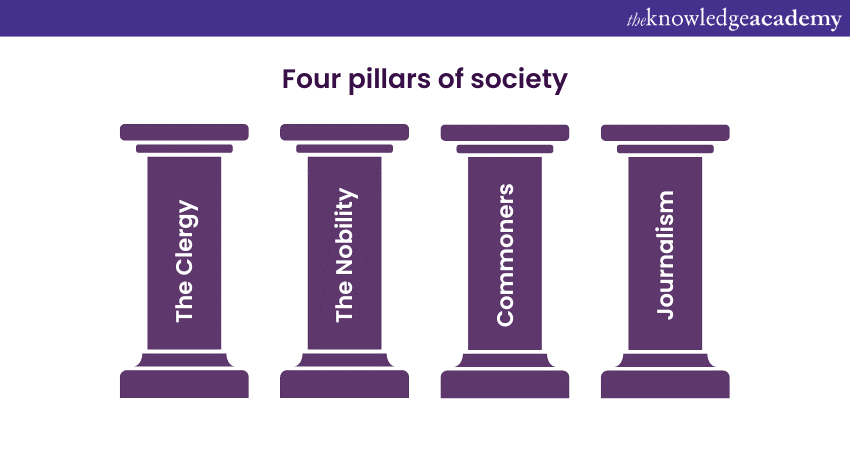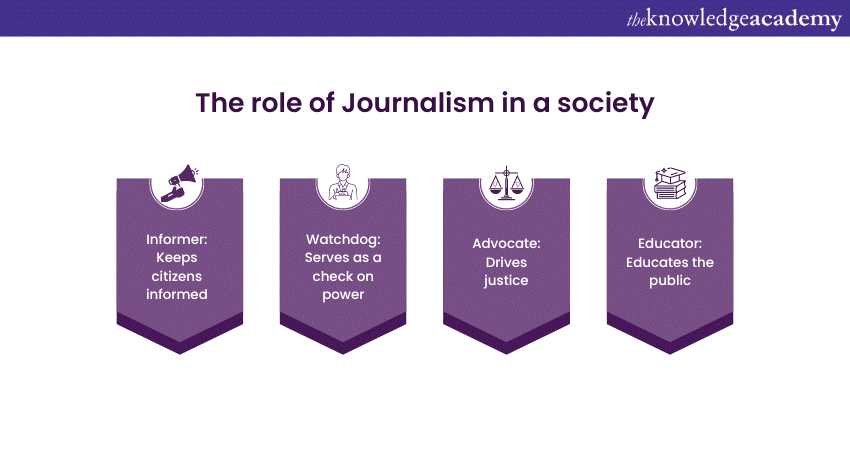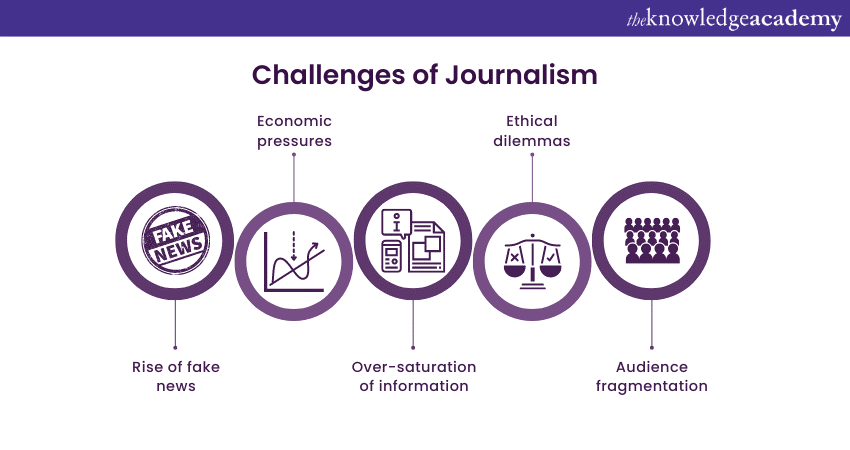We may not have the course you’re looking for. If you enquire or give us a call on + 1-866 272 8822 and speak to our training experts, we may still be able to help with your training requirements.
Training Outcomes Within Your Budget!
We ensure quality, budget-alignment, and timely delivery by our expert instructors.

At its core, journalism is the practice of gathering, assessing, creating, and presenting news and information to the public. So, Why is Journalism Important? Its importance cannot be overstated, as it serves as a foundational pillar of modern democratic societies. It ensures citizens are informed about their rights, roles, and responsibilities. It acts as a check on power, holding the government and other institutions accountable to the public.
According to Statista, the best press freedom index in Europe is 95.78 in 2023. Why is high press freedom index score important? Well, the higher the press freedom index, the higher the chances the people in that country are well-informed about the world. In this blog, you will learn Why is Journalism Important, the role of journalism and the challenges faced. Read on further to know more!
Table of Contents
1) What is Journalism?
2) Why is Journalism Important?
3) The role of Journalism in a society
4) What are the challenges of Journalism?
5) Conclusion
What is Journalism?
Journalism can be defined as the act of gathering, assessing, creating, and presenting information. It is the discipline of collecting data, verifying its authenticity, and crafting it into a structured narrative for the audience's consumption. Journalists serve as messengers and interpreters of events and facts, providing context, analysis, and insights that help the public make sense of the world around them.
With the advent of the digital age, the importance of Journalism has undergone significant transformations. From print newspapers and radio broadcasts to television and now online platforms, the mediums may have changed, but the essence remains the same. Good Journalism challenges perspectives, educates communities, and instigates positive change.
Unlock the world of journalism with our Get into Journalism Training.
Why is Journalism Important?
In this section you will learn in detail, Why is Journalism Important, to make informed and proper choices.
Guardian of democracy

Journalism is often known as the "Fourth Estate." This term encapsulates the immense power and responsibility Journalism holds. The other three estates are The Clergy, The Nobility, and Commoners. These three estates represent different pillars of society. In democratic societies, Journalism ensures that the actions of those in power are constantly under scrutiny. A robust journalistic presence means leaders are less likely to abuse their position, knowing that their actions are being monitored and will be relayed to the public.
Informed decision-making
A democracy thrives on the decisions of its citizens, and these decisions are only as good as the information they are based on. Whether voting for leaders, supporting policies, or any other civic duty, an informed citizenry is crucial. Journalism ensures that every individual has access to accurate, unbiased, and comprehensive information to make choices that shape the society they want to live in.
Social catalyst
The importance of Journalism has historically played a role in instigating social change. By highlighting societal issues – be it civil rights movements, health crises, or economic disparities- Journalism brings matters that might be overlooked or suppressed to the forefront. When stories of injustice, discrimination, or human interest are presented to a broad audience, they can galvanise collective action. These actions lead to sparking reforms and leading to societal advancements.
A unifying force
Journalism has the power to share stories from various corners of the globe. This helps in fostering empathy and understanding. When people read about the challenges and triumphs of communities different from theirs, it creates a sense of shared humanity. In essence, Journalism can be a force that unites rather than divides.
Accountability and transparency
One of the core tenets of Journalism is to seek the truth and relay it to the public. This involves not only reporting events as they happen but also investigating deeper, often challenging powerful institutions and individuals. Investigative Journalism has led to the unearthing of significant scandals, malpractices, and corruption, leading to reforms and justice. Doing so ensures that organisations, whether governmental or corporate, remain transparent and accountable for their actions.
A check on misinformation
The importance of Journalism is to stand as a bulwark against this tide of misinformation. With rigorous fact-checking, validation, and a commitment to truth, Journalism acts as a filter. This helps ensure the information that reaches the public has been scrutinised for accuracy.
7. Economic implications
Journalism has substantial economic implications. Financial Journalism, for instance, keeps businesses and investors informed about market trends, government policies, and corporate performances. This information drives investment decisions, job markets, and economic policies.
Reflection and growth
Journalism acts as a mirror. They reflect society's state, warts and all. This reflection is an invitation for introspection and growth. When societies know their flaws, they are better positioned to address them. Journalism highlights the systemic racism, gender inequalities, or environmental degradation and pushes societies towards evolution and betterment.
Celebrating human achievement
While a significant part of Journalism focuses on the challenges and issues societies face, it also plays a pivotal role in celebrating human achievement. Stories of innovation, bravery, art, and human resilience find their way to the public, inspiring others and bringing moments of joy and pride.
Serving as a historical record
Journalism captures moments as they happen, creating a running record of events, decisions, and key figures. These chronicles are invaluable for historians, researchers, and future generations to understand different eras' socio-political and cultural contexts.
Promoting cultural understanding
Through feature stories, interviews, and cultural reporting, Journalism showcases art, music, literature, and traditions from diverse communities. This not only celebrates the richness of human cultures but also promotes mutual respect and understanding among diverse populations.
Providing a platform for marginalised voices
Good Journalism seeks stories from all sections of society, not just the powerful or influential. Journalism brings attention to marginalised or underrepresented groups' challenges, aspirations, and perspectives.
Encouraging civic engagement
Journalism fosters a sense of community and encourages civic engagement by reporting on local community issues, events, and developments. An informed public is likelier to participate in community activities, from town hall meetings to local charity events.
Setting the agenda for public discourse
The issues highlighted prominently in reputable news outlets often become the topics of public discourse, debate, and sometimes policymaking. Journalism has the power to prioritise issues, directing public attention and resources where they're most needed.
Educating the public
Journalism educates the public on various topics, including scientific breakthroughs, health advisories, and technological advancements. In-depth articles, documentaries, and interviews provide the public with knowledge that can influence personal choices and overall lifestyle.
Enhancing accountability through public feedback
Modern Journalism, especially in the digital era, allows for real-time feedback from the public. Readers' comments, social media interactions, and public polls can influence subsequent reporting or even lead to further investigations. This two-way interaction ensures that it is not just about broadcasting but also about listening.
Serving as a check-in emergency
In times of natural disasters, political upheavals, or health crises, reliable Journalism becomes a primary source of updates, advisories, and safety measures. Relaying verified information quickly can play a vital role in disaster response and management.
Upholding ethical standards
Reputable journalistic platforms maintain a code of ethics that emphasises accuracy, fairness, impartiality, and integrity. These standards set it apart from other forms of content, ensuring that the public receives information vetted for facts and ethical considerations.
Supporting economic health
Local Journalism supports economic health by highlighting local businesses, events, and opportunities. Such exposure can boost local economies and foster community support.
Challenging the status quo
Journalism doesn’t just report on current events but challenges the status quo. Investigative pieces, op-eds, and in-depth analyses can provoke thought, question established norms, and drive societal innovation.
Empower your personal growth with our Personal Development Training .
The role of Journalism in a society
Let us now see, how Journalism plays its role in truly transforming a society:

1) Informer: Journalism acts as society's primary source of information, keeping citizens informed about local, national, and international events. A well-informed populace can make decisions rooted in fact and reality.
2) Watchdog: Often termed as the "Fourth Estate," Journalism serves as a check on power. By scrutinising government actions, corporate decisions, and other influential entities, it ensures transparency and accountability.
3) Advocate: Journalism has the power to champion causes, from social reforms to environmental protections. It amplifies marginalised voices and can drive movements towards justice and change.
4) Educator: Beyond current events, Journalism educates the public on diverse topics like science, health, and technology. Feature pieces, in-depth reports, and documentaries offer nuanced understandings on complex subjects.
5) Historical recorder: Journalism provides a contemporaneous record of events, capturing the zeitgeist of eras. These records become valuable resources for future generations, historians, and researchers.
6) Platform for debate: Journalism sparks public discourse by presenting varied viewpoints and hosting debates. This facilitates a healthy exchange of ideas and nurtures democratic values.
7) Detector of misinformation: Journalism serves as a reliable filter. Fact-checking and verification processes ensure that society receives accurate information, preventing potential harm or panic.
8) Economic navigator: Financial Journalism provides insights into market trends, investment advice, and economic indicators. This information is crucial for businesses, investors, and individuals to make informed economic decisions.
9) Cultural promoter: Journalism showcases art, literature, music, and cultural events. It plays a role in promoting cultural appreciation and heritage preservation.
10) Social catalyst: Through investigative reporting, Journalism can uncover social issues, from discrimination practices to health crises. Highlighting these issues can lead to reforms and policy changes.
11) Emergency responder: During crises, be it natural disasters or conflicts, Journalism offers real-time updates. It provides safety guidelines, resource locations, and rescue efforts, aiding in effective disaster management.
12) Ethical standard bearer: Credible Journalism operates under a stringent code of ethics. It sets the standard for truth, accuracy, and integrity in information dissemination.
13) Feedback channel: Modern Journalism encourages public feedback through comments, polls, and social media interactions. This two-way communication ensures that the media stays in touch with the pulse of society.
14) Economic booster: Local Journalism, especially, can promote local businesses, events, and talents. This can boost regional economies, fostering community growth and collaboration.
Unleash your creative potential with our Creative Writing Training.
What are the challenges of Journalism?
Even though Journalism makes a brave effort to help the public stay informed on correct information and news, there are a lot of challenges that the Journalists have to face in their daily life. They are:

1) The rise of fake news: In this digital age, misinformation spreads rapidly. The ubiquity of social media platforms and the ease with which information can be shared means that unverified and sometimes blatantly false narratives can gain traction quickly. Distinguishing between genuine news and fake stories becomes a challenge for both journalists and audiences.
2) Economic pressures: Many traditional news outlets face financial struggles with the rise of digital media. Declining revenues from print advertisements, competition from online platforms, and the challenge of making digital news profitable put pressure on organisations, sometimes compromising editorial independence.
3) Threats to journalistic independence: Corporate ownership, political biases, and external pressures can impede journalistic autonomy. In some parts of the world, governments exert control over the media, and journalists face threats, imprisonment, or even assassination for covering sensitive topics.
4) Over-saturation of information: With numerous sources available, there's an overload of information. This over-saturation makes it challenging for audiences to discern the quality of content. For journalists, the challenge lies in making their authentic and well-researched stories stand out amidst the noise.
5) Ethical dilemmas: From deciding whether to grant a source anonymity to grappling with how to cover sensitive topics like terrorism or suicide, Journalists frequently face moral difficulties that can impact the public's perception and trust.
6) Rapid technological changes: The evolution of technology demands journalists to update their skills constantly. The modern journalist must be technologically adept, from learning about the latest social media algorithms to understanding data analytics or navigating drone journalism.
7) Audience fragmentation: Today's audience is spread across various platforms, from traditional newspapers to podcasts, blogs, and social media channels. Catering to such a fragmented audience and ensuring consistent quality and reach becomes formidable.
8) Diminishing trust: Public trust in media has been eroding in many parts of the world. Accusations of "fake news" or media bias, whether justified or not, have contributed to scepticism about the reliability of news sources.
9) Security concerns: Journalists often risk their lives in conflict zones or authoritarian regimes to get the story. Furthermore, with the rise of cyber threats, even journalists outside these zones face risks, such as hacking or online harassment.
10) Adaptation to new storytelling formats: The digital age offers a plethora of storytelling formats, from interactive graphics to augmented reality Journalism. Adapting to these formats while maintaining journalistic integrity is both a challenge and an opportunity.
11) Balancing speed with accuracy: The 24-hour news cycle and the immediacy of online news platforms create pressure to publish stories rapidly. Balancing this need for speed with the imperative of accuracy is a constant challenge.
12) Diverse representation: Ensuring diverse representation in newsrooms and news stories is essential to cater to a global audience. However, many media organisations grapple with inclusivity challenges, often leading to a narrow or biased perspective in their coverage.
Conclusion
Journalism faces multifaceted challenges. We hope after reading this blog, you understood Why is Journalism Important. To summarise, Journalism addresses the problems which may intend to disrupt society. Maintaining the principles of Journalism is crucial for preserving the integrity and role of media in democracy. It's imperative for society, journalists, and media organisations to collaboratively uphold and champion the principles of truthful, unbiased, and impactful journalism.
Master the art of professional communication with our E-mail Etiquette Training.
Frequently Asked Questions
Upcoming Business Skills Resources Batches & Dates
Date
 Time Management Training
Time Management Training
Fri 10th Jan 2025
Fri 14th Feb 2025
Fri 11th Apr 2025
Fri 23rd May 2025
Fri 8th Aug 2025
Fri 26th Sep 2025
Fri 21st Nov 2025







 Top Rated Course
Top Rated Course



 If you wish to make any changes to your course, please
If you wish to make any changes to your course, please


